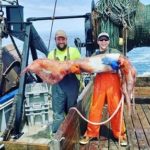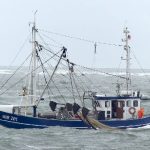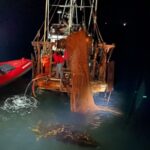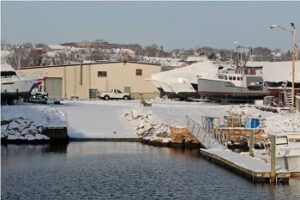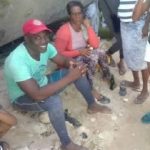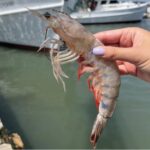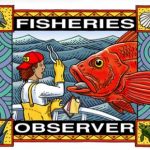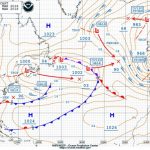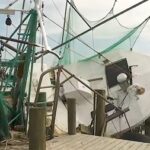Monthly Archives: September 2015
Top fisheries regulator blends into the crowd at Working Waterfront Festival
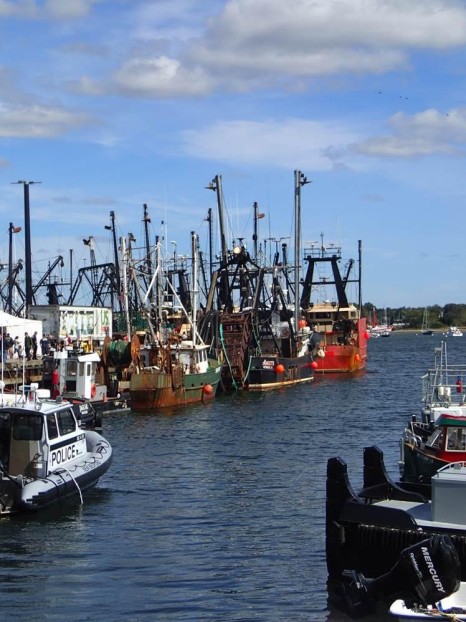 In the closing hours of a picture-perfect day for the New Bedford Waterfront Festival, about 15 pretty important people were meeting in a stuffy, windowless third-floor conference room up three flights of stairs at the State Pier building. NOAA Assistant Administrator for Fisheries Eileen Sobeck. She was here at the invitation of Mayor Mitchell, and the arrangements were done pretty quietly. Former Mayor John Bullard was there because, as he is now regional administrator for NOAA Fisheries in the Northeast, Sobek is his boss. He deferred all questions to her. Read the rest here 07:16
In the closing hours of a picture-perfect day for the New Bedford Waterfront Festival, about 15 pretty important people were meeting in a stuffy, windowless third-floor conference room up three flights of stairs at the State Pier building. NOAA Assistant Administrator for Fisheries Eileen Sobeck. She was here at the invitation of Mayor Mitchell, and the arrangements were done pretty quietly. Former Mayor John Bullard was there because, as he is now regional administrator for NOAA Fisheries in the Northeast, Sobek is his boss. He deferred all questions to her. Read the rest here 07:16
Rhode Island Fishermen’s Alliance Weekly Update, September 27, 2015
 The Rhode Island Fishermen’s Alliance is dedicated to its mission of continuing to help create sustainable fisheries without putting licensed fishermen out of business.” Read the update here To read all the updates, click here 13:06
The Rhode Island Fishermen’s Alliance is dedicated to its mission of continuing to help create sustainable fisheries without putting licensed fishermen out of business.” Read the update here To read all the updates, click here 13:06
As Black Sea Bass Stake New England Claim, Fishermen are Concerned.
 As waters warm off the coast of New England, black sea bass are moving north and, fishermen say, threatening the region’s most valuable aquatic species: the lobster. The influx of sea bass — among a number of species that are appearing in greater numbers off of Maine and New Hampshire as ocean temperatures climb — has some fishermen and lobstermen saying the best solution is to ease restrictions on catching the newcomers. The sea bass prey on lobsters, a much more economically important commercial species and a key,,, Read the rest here 12:18
As waters warm off the coast of New England, black sea bass are moving north and, fishermen say, threatening the region’s most valuable aquatic species: the lobster. The influx of sea bass — among a number of species that are appearing in greater numbers off of Maine and New Hampshire as ocean temperatures climb — has some fishermen and lobstermen saying the best solution is to ease restrictions on catching the newcomers. The sea bass prey on lobsters, a much more economically important commercial species and a key,,, Read the rest here 12:18
Great lobster catches in Portland, Maine, just don’t name them
The recommended dress aboard the Lucky Catch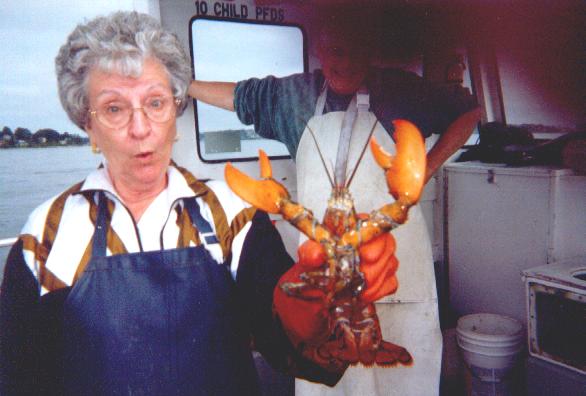 was an orange rubber apron and matching glove. Baiting lobster traps is a messy business. First mate Rachel Ashman distributed the required equipment to our eager, paying crew of 14 on a tour last week. It wasn’t surgery, but things did have to be done a certain way. Quart-sized mesh bags had to be pulled open, five stinky herrings dropped in, and the bag cinched closed. Once filled, they would be used to re-stock the traps. I got a whiff of the herring, stepped back, and took pictures. Read the rest here 11:33
was an orange rubber apron and matching glove. Baiting lobster traps is a messy business. First mate Rachel Ashman distributed the required equipment to our eager, paying crew of 14 on a tour last week. It wasn’t surgery, but things did have to be done a certain way. Quart-sized mesh bags had to be pulled open, five stinky herrings dropped in, and the bag cinched closed. Once filled, they would be used to re-stock the traps. I got a whiff of the herring, stepped back, and took pictures. Read the rest here 11:33
At the Boiling Point – Southern flounder in N.C.
 The fish fight has erupted into an all-out battle focused on the state’s nine-member Marine Fisheries Commission, now tasked with finding a solution that will pacify policy makers, unburden fishermen and keep the flounder swimming. “I think this is relatively newer to the legislators, and I think they probably jumped the gun on it,” said commission member Mike Wicker, who is also a biologist with the U.S. Fish and Wildlife Service. “I think they want to represent what their constituency would like them to represent, but I don’t think they’ve had enough time to understand what their constituency wants.” Read the rest here 10:58
The fish fight has erupted into an all-out battle focused on the state’s nine-member Marine Fisheries Commission, now tasked with finding a solution that will pacify policy makers, unburden fishermen and keep the flounder swimming. “I think this is relatively newer to the legislators, and I think they probably jumped the gun on it,” said commission member Mike Wicker, who is also a biologist with the U.S. Fish and Wildlife Service. “I think they want to represent what their constituency would like them to represent, but I don’t think they’ve had enough time to understand what their constituency wants.” Read the rest here 10:58
What It’s Like to Fish in the Shadow of a Nuclear Power Station
 A beach sandwiched between a nuclear power station, a baron wasteland of shingle, and the vast expanse of the English Channel probably isn’t where you’d expect to find a family fishing operation. But the headland of Dungeness in England’s southeastern corner is home to the Thomas family, who’ve been fishing the waters of this coastal Kent community for generations. As I head down to the water, I’m greeted by a man leaning against a rusty yellow vehicle. Read the rest here 10:40
A beach sandwiched between a nuclear power station, a baron wasteland of shingle, and the vast expanse of the English Channel probably isn’t where you’d expect to find a family fishing operation. But the headland of Dungeness in England’s southeastern corner is home to the Thomas family, who’ve been fishing the waters of this coastal Kent community for generations. As I head down to the water, I’m greeted by a man leaning against a rusty yellow vehicle. Read the rest here 10:40
Coast Guard saves two from sunk fishing boat 50 miles east of Portland, ME
 Coast Guard rescue crews from Station Boothbay Harbor, the Coast Guard Cutters Campbell and Ocracoke, and Air Station Cape Cod saved two people from their sunken fishing vessel the Jeanne C. 50 nautical miles east of Portland, Maine, Friday. “Their boat sunk right out from underneath them,” said Lt. Samantha Leon, the command duty officer at the 1st District Command Center. “They had the proper safety equipment, like the life-raft, onboard and were able to get in quickly. They helped save their own lives.” Read the rest here 09:45
Coast Guard rescue crews from Station Boothbay Harbor, the Coast Guard Cutters Campbell and Ocracoke, and Air Station Cape Cod saved two people from their sunken fishing vessel the Jeanne C. 50 nautical miles east of Portland, Maine, Friday. “Their boat sunk right out from underneath them,” said Lt. Samantha Leon, the command duty officer at the 1st District Command Center. “They had the proper safety equipment, like the life-raft, onboard and were able to get in quickly. They helped save their own lives.” Read the rest here 09:45
Threatened Government Shutdown Threatens Crab Fishery… Again
 “It was a huge mess last time,” said Mark Gleason, executive director of the trade group, Alaska Bering Sea Crabbers. “We have a very tight time frame – when the fishery opens on October 15, we need to be out there getting that crab caught, processed and on its way to Japan to take advantage of the holiday market.” A shutdown means no federal workers are on the job to issue permits for those holding catch shares of the crab. No permits, no fishery. Read the rest here 09:13
“It was a huge mess last time,” said Mark Gleason, executive director of the trade group, Alaska Bering Sea Crabbers. “We have a very tight time frame – when the fishery opens on October 15, we need to be out there getting that crab caught, processed and on its way to Japan to take advantage of the holiday market.” A shutdown means no federal workers are on the job to issue permits for those holding catch shares of the crab. No permits, no fishery. Read the rest here 09:13
Activists, NMFS face off in federal court over ahi quotas “This is allowing them to fish without limits,” ??
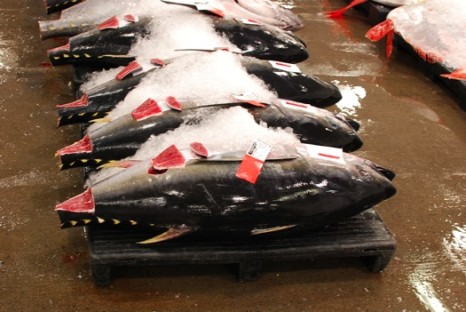 Environmentalists on Friday asked a federal judge to stop the National Marine Fisheries Service from allowing Hawaii-based fishermen to attribute some of the bigeye tuna they catch to U.S. territories. They argue the agency is enabling the fishermen to circumvent international agreements aimed at controlling the overfishing of the popular tuna species known as ahi. Earthjustice attorney David Henkin told U.S. District Judge Leslie Kobayashi the fisheries service acted illegally when it created a framework allowing Hawaii longline fishermen to record some of their catch as having been caught by fishermen in Guam, the Northern Mariana Islands and American Samoa. Read the rest here 17:26
Environmentalists on Friday asked a federal judge to stop the National Marine Fisheries Service from allowing Hawaii-based fishermen to attribute some of the bigeye tuna they catch to U.S. territories. They argue the agency is enabling the fishermen to circumvent international agreements aimed at controlling the overfishing of the popular tuna species known as ahi. Earthjustice attorney David Henkin told U.S. District Judge Leslie Kobayashi the fisheries service acted illegally when it created a framework allowing Hawaii longline fishermen to record some of their catch as having been caught by fishermen in Guam, the Northern Mariana Islands and American Samoa. Read the rest here 17:26
Past The Breakwater – full documentary
https://www.youtube.com/watch?v=D4srB1voygo&feature=youtu.be
Right whales have Cape Breton Whelk fishermen on hold.
 One Cape Breton fisherman says concern over changing migration patterns of endangered right whales are already having an impact on his ability to earn a living. Derrick Wadden, a multi-species fisherman, said he invested more than $7,000 this year in ropes and custom-made traps for whelk, a large, undersea snail, in hopes of going fishing this month. Fisheries and Oceans Canada had indicated fishing conditions for whelk licences would be issued at the beginning of September, he said, but the conditions have been delayed due to concern about the potential for right whales to get tangled in gear. Read the rest here 14:56
One Cape Breton fisherman says concern over changing migration patterns of endangered right whales are already having an impact on his ability to earn a living. Derrick Wadden, a multi-species fisherman, said he invested more than $7,000 this year in ropes and custom-made traps for whelk, a large, undersea snail, in hopes of going fishing this month. Fisheries and Oceans Canada had indicated fishing conditions for whelk licences would be issued at the beginning of September, he said, but the conditions have been delayed due to concern about the potential for right whales to get tangled in gear. Read the rest here 14:56
Safe and Sound – Atlantic Charger crew reunited with family back in Newfoundland
 Crew members of an ill-fated fishing vessel have finally returned home to Newfoundland, after a tragic few days which saw them abandon their sinking boat and spend 10 hours at sea in a life raft off the coast of Nunavut. The men finally arrived in Harbour Grace round 9:30 a.m. Friday aboard the fishing trawler Katsheshuk, where they were greeted by anxious family members. Read the rest here 10:08
Crew members of an ill-fated fishing vessel have finally returned home to Newfoundland, after a tragic few days which saw them abandon their sinking boat and spend 10 hours at sea in a life raft off the coast of Nunavut. The men finally arrived in Harbour Grace round 9:30 a.m. Friday aboard the fishing trawler Katsheshuk, where they were greeted by anxious family members. Read the rest here 10:08
Atlantic States Marine Fisheries Commission’s limited entry scheme for Maine Shrimp Fishery postponed
Regulators are taking the possibility of a limited entry program for Maine’s shuttered shrimp fishery off the table for now. The  Northern Shrimp Section is postponing the development of the plan until next summer. The group has been looking at ways to manage the future of the fishery, including the possibility of allowing fewer fishermen to participate. The shrimp section is meeting on Dec. 7 to set specifications for the 2016 shrimp fishing season. A spokeswoman for the section says it is unlikely there will be a season at all in 2016. Link 09:48
Northern Shrimp Section is postponing the development of the plan until next summer. The group has been looking at ways to manage the future of the fishery, including the possibility of allowing fewer fishermen to participate. The shrimp section is meeting on Dec. 7 to set specifications for the 2016 shrimp fishing season. A spokeswoman for the section says it is unlikely there will be a season at all in 2016. Link 09:48
“State of Our Halibut” discussed at last weekend’s inaugural Homer Halibut Festival – It’s not good.
 From a fun run to a fish fry to a halibut cabaret, most of the weekend was a celebration of Homer’s iconic resource. But much of the discussion at Saturday’s “State of Our Halibut” lecture series at the Alaska Islands and Ocean Visitor Center was serious and centered around a major issue: the total mass of Pacific halibut is shrinking and no one is entirely sure why or what to do about it. That’s not entirely new information. Nearly ever year of the past decade, the annual survey reported decreases in both Pacific halibut population and biomass,,, Read the rest here 09:15
From a fun run to a fish fry to a halibut cabaret, most of the weekend was a celebration of Homer’s iconic resource. But much of the discussion at Saturday’s “State of Our Halibut” lecture series at the Alaska Islands and Ocean Visitor Center was serious and centered around a major issue: the total mass of Pacific halibut is shrinking and no one is entirely sure why or what to do about it. That’s not entirely new information. Nearly ever year of the past decade, the annual survey reported decreases in both Pacific halibut population and biomass,,, Read the rest here 09:15
Fish like a girl: This 23-year-old lobsterwoman from Maine is her own boss
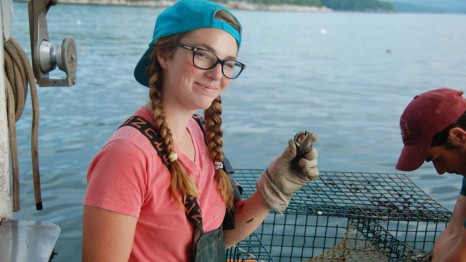 “When I was younger, I felt questioned by others, like whether I could do this,” Samuels said. “It makes you start to question yourself. I was like, ‘Can I do this? Am I strong enough to lift these traps?’” She made a wide circle and sidled her boat up next to the buoy. “And as I do it,” she continued, “I’m like, ‘Hell yeah, I am.’” “One thing I like about being a girl out here is that they can’t pay me less than a guy,” Sadie Samuels shouted over the grinding sound of her lobster boat’s mechanical pulley as it hoisted a trap up from the bottom of the ocean. Read the rest here 08:29
“When I was younger, I felt questioned by others, like whether I could do this,” Samuels said. “It makes you start to question yourself. I was like, ‘Can I do this? Am I strong enough to lift these traps?’” She made a wide circle and sidled her boat up next to the buoy. “And as I do it,” she continued, “I’m like, ‘Hell yeah, I am.’” “One thing I like about being a girl out here is that they can’t pay me less than a guy,” Sadie Samuels shouted over the grinding sound of her lobster boat’s mechanical pulley as it hoisted a trap up from the bottom of the ocean. Read the rest here 08:29
Fishermen Plan Demonstration during NEFMC Meeting in Plymouth Wednesday, 2 to 4 p.m.
 The Northwest Atlantic Marine Alliance is the group spearheading Wednesday’s demonstration, which is scheduled for 2 to 4 p.m. outside the fisheries council meeting at the Radisson hotel on Water Street in Plymouth. Stephen Welch, who lives in Hanover and fishes out of Scituate and Hyannis, plans to be at Wednesday’s demonstration. “I used to have two boats and eight employees. Now I have one boat and one employee,” said Welch, a member of Northwest Atlantic Marine Alliance, a fishermen-led organization. Read the rest here 07:52
The Northwest Atlantic Marine Alliance is the group spearheading Wednesday’s demonstration, which is scheduled for 2 to 4 p.m. outside the fisheries council meeting at the Radisson hotel on Water Street in Plymouth. Stephen Welch, who lives in Hanover and fishes out of Scituate and Hyannis, plans to be at Wednesday’s demonstration. “I used to have two boats and eight employees. Now I have one boat and one employee,” said Welch, a member of Northwest Atlantic Marine Alliance, a fishermen-led organization. Read the rest here 07:52
“Concentrated fish poo is just not Pure Michigan,” Sen. Jones works to ban fish farming in the Great Lakes
 “In Michigan, legislators have a Constitutional duty to protect our Great Lakes,” said Jones, R-Grand Ledge. “By allowing commercial fish farming we can say goodbye to our Pure Michigan status and hello to an undrinkable Toledo water supply.” Jones said commercial fish farms in the Great Lakes are all risk and no reward. These are proven sources of pollution, invasive species, disease, and fugitive fish escaping to wreak havoc on our Great Lakes fisheries. Read the rest here 07:06
“In Michigan, legislators have a Constitutional duty to protect our Great Lakes,” said Jones, R-Grand Ledge. “By allowing commercial fish farming we can say goodbye to our Pure Michigan status and hello to an undrinkable Toledo water supply.” Jones said commercial fish farms in the Great Lakes are all risk and no reward. These are proven sources of pollution, invasive species, disease, and fugitive fish escaping to wreak havoc on our Great Lakes fisheries. Read the rest here 07:06
Training aims to bring Fishermen back alive
 From the article: More than half of all commercial fishing deaths in the 2000s occurred after a vessel disaster. Of disasters with known causes, nearly a third involved vessels flooding. When at sea, he said, boaters have to be creative in finding anything around them to slow down flooding, be it a tarp, pieces of wood, neoprene scraps from old immersion suits — even the SpongeBob SquarePants Nerf ball the crew of the fishing vessel Clam Juice from Gloucester, Massachusetts, stuck in an exhaust-pipe hole to keep their vessel from sinking as they were towed home. Read the rest here 17:03
From the article: More than half of all commercial fishing deaths in the 2000s occurred after a vessel disaster. Of disasters with known causes, nearly a third involved vessels flooding. When at sea, he said, boaters have to be creative in finding anything around them to slow down flooding, be it a tarp, pieces of wood, neoprene scraps from old immersion suits — even the SpongeBob SquarePants Nerf ball the crew of the fishing vessel Clam Juice from Gloucester, Massachusetts, stuck in an exhaust-pipe hole to keep their vessel from sinking as they were towed home. Read the rest here 17:03
NOAA Seeks Letters of Public Support for International Pacific Halibut Commission (IPHC) Nominees
 NOAA Fisheries is seeking letters of public support for nominees (listed below) for two presidential appointments to serve as U.S. Commissioners to the International Pacific Halibut Commission. The IPHC is a bilateral regional fishery management organization established between Canada and the United States for the management of the Pacific halibut fishery. Terms expire for the current commissioners December 31, 2015. Commissioners are eligible for reappointment. Of the two appointees, one must be a resident of Alaska and the other shall be a nonresident of Alaska. Read the rest here 16:48
NOAA Fisheries is seeking letters of public support for nominees (listed below) for two presidential appointments to serve as U.S. Commissioners to the International Pacific Halibut Commission. The IPHC is a bilateral regional fishery management organization established between Canada and the United States for the management of the Pacific halibut fishery. Terms expire for the current commissioners December 31, 2015. Commissioners are eligible for reappointment. Of the two appointees, one must be a resident of Alaska and the other shall be a nonresident of Alaska. Read the rest here 16:48
Stop Wall Street Fisheries and Protect Main Street Fishermen – Please sign this Petition
 My name is Ed Snell and I am a fisherman based in Portland, Maine. We have allowed a system that has monetized access to fish and paved the way for very few entities to ‘own’ the right to catch and sell fish stocks. This means that fishermen without much (or any) fish quota are forced to lease quota from other permits, often for prices that approach and sometimes exceed the market price for that fish. In other words, fishermen are fishing at a loss, because others control their legal ability to go fishing. Please read the rest, and sign the petition. Thank you. 16:25
My name is Ed Snell and I am a fisherman based in Portland, Maine. We have allowed a system that has monetized access to fish and paved the way for very few entities to ‘own’ the right to catch and sell fish stocks. This means that fishermen without much (or any) fish quota are forced to lease quota from other permits, often for prices that approach and sometimes exceed the market price for that fish. In other words, fishermen are fishing at a loss, because others control their legal ability to go fishing. Please read the rest, and sign the petition. Thank you. 16:25
‘I’m from the government and I’m here to help you’
 The Working Waterfront Festival takes place this weekend and features the traditional Blessing of the Fleet, to be held Sunday afternoon on the State Pier. This year, New Bedford welcomes NOAA’s Eileen Sobeck to the ceremony. Ms. Sobeck holds the title of Assistant Administrator for Fisheries, and in that capacity oversees the management and conservation of marine fisheries. According to the NOAA web site: “Her focus is on rebuilding the nation’s fisheries and the jobs and livelihoods that depend on them by promoting management approaches that will achieve both sustainable fisheries and vibrant coastal communities.” It is difficult to reconcile such lofty goals with the harsh reality facing New England groundfishermen today. Read the rest here 15:44
The Working Waterfront Festival takes place this weekend and features the traditional Blessing of the Fleet, to be held Sunday afternoon on the State Pier. This year, New Bedford welcomes NOAA’s Eileen Sobeck to the ceremony. Ms. Sobeck holds the title of Assistant Administrator for Fisheries, and in that capacity oversees the management and conservation of marine fisheries. According to the NOAA web site: “Her focus is on rebuilding the nation’s fisheries and the jobs and livelihoods that depend on them by promoting management approaches that will achieve both sustainable fisheries and vibrant coastal communities.” It is difficult to reconcile such lofty goals with the harsh reality facing New England groundfishermen today. Read the rest here 15:44
Community Development Quota entities also affect Kodiak fisheries
 Fishermen all over America wonder about the special fishing rights given to the Western Alaska near shore villages, about 65 of them by name, in the Magnuson-Stevens Act. That was one of Ted’s biggest blunders. Now, at least one member of a regional fish council appears to be helping corrupt public elections. It’s a mess few understand, but with hundreds of millions a year at stake, and advantages that normal competitors cannot match when it comes to markets for quota catch shares. Tim Smith of Nome is asking for greater transparency and accountability. Here’s his latest piece, edited just for you. Read the rest here 13:35
Fishermen all over America wonder about the special fishing rights given to the Western Alaska near shore villages, about 65 of them by name, in the Magnuson-Stevens Act. That was one of Ted’s biggest blunders. Now, at least one member of a regional fish council appears to be helping corrupt public elections. It’s a mess few understand, but with hundreds of millions a year at stake, and advantages that normal competitors cannot match when it comes to markets for quota catch shares. Tim Smith of Nome is asking for greater transparency and accountability. Here’s his latest piece, edited just for you. Read the rest here 13:35
Dolphins – Friend or Food?
 Dolphins are often collateral damage of the fishing industry — they get entangled in fishing gear targeted at other fish species, and often sustain injuries and die. But what happens to such accidentally-trapped dolphins? Sometimes they get eaten, researchers have found. Small-scale or artisanal fishermen and women in West Africa commonly treat such accidentally caught animals as an , according to a recent study. Read the rest here 12:21
Dolphins are often collateral damage of the fishing industry — they get entangled in fishing gear targeted at other fish species, and often sustain injuries and die. But what happens to such accidentally-trapped dolphins? Sometimes they get eaten, researchers have found. Small-scale or artisanal fishermen and women in West Africa commonly treat such accidentally caught animals as an , according to a recent study. Read the rest here 12:21
New Bedford Working Waterfront Festival gives visitors a free, fun behind-the-scenes look – Sept 26th, and 27th
 The 12th annual Working Waterfront Festival lets the public get a firsthand look at the culture of fishing and for the commercial fishing community to tell its own story. The event presents all that goes into bringing seafood from the ocean to the table. This year’s theme is “Every Object Tells a Story.” Here’s the part I like the best! My friend Hunter Lees of Fairhaven, will make his runway debut and modeling the latest apparel! Lees says that he loves his chosen profession and is following in the footsteps of his father Thomas Lees and his uncle, Toby Lees. Read the rest here 11:41
The 12th annual Working Waterfront Festival lets the public get a firsthand look at the culture of fishing and for the commercial fishing community to tell its own story. The event presents all that goes into bringing seafood from the ocean to the table. This year’s theme is “Every Object Tells a Story.” Here’s the part I like the best! My friend Hunter Lees of Fairhaven, will make his runway debut and modeling the latest apparel! Lees says that he loves his chosen profession and is following in the footsteps of his father Thomas Lees and his uncle, Toby Lees. Read the rest here 11:41
School Principle bans seafood from lunches because one student has a seafood allergy! BRILLIANT!
 One of the largest elementary schools on P.E.I. has banned seafood from students’ lunches because a student has a life-threatening allergy. Parents at Stratford Elementary received a memo this week saying students can no longer bring seafood of any kind to school.”Fish is a new one, so I think that causes a bit of you know, a bit of a pain for parents. It’s a new one and I even had a parent ask me today, you know, ‘what’s next?’ and really don’t have the answer to that,” said principal Kenny MacDougall. “As principal of the school, I have to ensure the safety and wellbeing of all students and that’s why we’re asking parents’ cooperation in such a serious matter.”MacDougall said staff try their best to make sure banned foods don’t enter the school. He’s asking parents and students to be extra cautious when packing lunches. Link 10:25
One of the largest elementary schools on P.E.I. has banned seafood from students’ lunches because a student has a life-threatening allergy. Parents at Stratford Elementary received a memo this week saying students can no longer bring seafood of any kind to school.”Fish is a new one, so I think that causes a bit of you know, a bit of a pain for parents. It’s a new one and I even had a parent ask me today, you know, ‘what’s next?’ and really don’t have the answer to that,” said principal Kenny MacDougall. “As principal of the school, I have to ensure the safety and wellbeing of all students and that’s why we’re asking parents’ cooperation in such a serious matter.”MacDougall said staff try their best to make sure banned foods don’t enter the school. He’s asking parents and students to be extra cautious when packing lunches. Link 10:25
Norwegian firm Grieg Seafarms poised to invest $300 million in Placentia Bay
 But Marystown Mayor Sam Synard is predicting that Placentia Bay will soon become the industry’s epicentre. He said a Norwegian company is poised to invest some $300 million into , including a hatchery in Marystown. Representatives from the company are in attendance at the industrial showcase in Placentia, and declined an interview request from CBC News Wednesday, Read the rest here 09:41
But Marystown Mayor Sam Synard is predicting that Placentia Bay will soon become the industry’s epicentre. He said a Norwegian company is poised to invest some $300 million into , including a hatchery in Marystown. Representatives from the company are in attendance at the industrial showcase in Placentia, and declined an interview request from CBC News Wednesday, Read the rest here 09:41
‘You will die’: Adam Moser’s parents speak out on drug death
 It has only been four days since Jeanne and Jim Moser lost their son Adam to an apparent drug overdose, but on Wednesday, the family began to speak out, pleading with parents and friends not to turn a blind eye to the opiate epidemic in the Seacoast. Adam died at age 27 on Saturday, Sept. 19 from an apparent overdose in Portsmouth of what his father Jim said was likely pure fentanyl, a drug commonly laced in heroin. Moser was well-known to many Seacoast residents and beyond for his tuna-fishing exploits on the National Geographic Channel television series “Wicked Tuna,” Read the rest here 09:02
It has only been four days since Jeanne and Jim Moser lost their son Adam to an apparent drug overdose, but on Wednesday, the family began to speak out, pleading with parents and friends not to turn a blind eye to the opiate epidemic in the Seacoast. Adam died at age 27 on Saturday, Sept. 19 from an apparent overdose in Portsmouth of what his father Jim said was likely pure fentanyl, a drug commonly laced in heroin. Moser was well-known to many Seacoast residents and beyond for his tuna-fishing exploits on the National Geographic Channel television series “Wicked Tuna,” Read the rest here 09:02
That Bogus WWF ‘death’ of the world’s oceans report? – Marine populations unchanged for almost 30 years
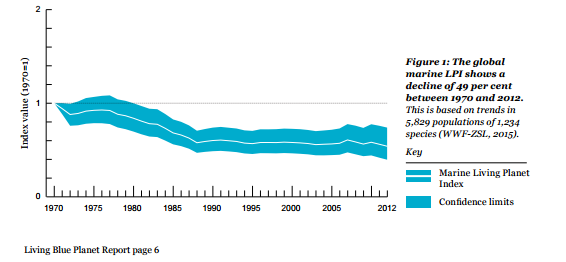 “The report states that 61% of commercial fish stocks are fully exploited misleadingly implying that these stocks are overfished and not sustainably exploited,” said Europêche Managing Director Kathryn Stack. “In fact, if we look at the FAO report in question, it clearly states that over 70% of global fish stocks are within biologically sustainable levels (below or at MSY levels i.e. full exploitation, which incidentally is the objective of the CFP and many RFMOs by 2020)**. It is unacceptable that an organisation such as WWF can be allowed to distort information which has a huge impact on the fishing sector’s reputation.” Read the rest here 08:11
“The report states that 61% of commercial fish stocks are fully exploited misleadingly implying that these stocks are overfished and not sustainably exploited,” said Europêche Managing Director Kathryn Stack. “In fact, if we look at the FAO report in question, it clearly states that over 70% of global fish stocks are within biologically sustainable levels (below or at MSY levels i.e. full exploitation, which incidentally is the objective of the CFP and many RFMOs by 2020)**. It is unacceptable that an organisation such as WWF can be allowed to distort information which has a huge impact on the fishing sector’s reputation.” Read the rest here 08:11
Washington Fish and Wildlife seize nearly 700 illegal crab pots
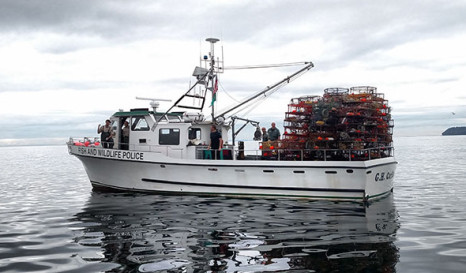 The Washington Department of Fish and Wildlife (WDFW) and tribal police seized 674 illegal crab pots from the waters off Blaine. Twelve WDFW agents and four officers from Tulalip Police conducted the two-day sweep. WDFW sergeant Russ Mullins led the investigation. Mullins said the department tries to run a sweep for illegal Canadian crab pots in every other year. “Typically, we have a problem with Canadian commercial fishermen operating in our waters without licenses,” he said. “This has been a historic problem for,,, Read the rest here 20:11
The Washington Department of Fish and Wildlife (WDFW) and tribal police seized 674 illegal crab pots from the waters off Blaine. Twelve WDFW agents and four officers from Tulalip Police conducted the two-day sweep. WDFW sergeant Russ Mullins led the investigation. Mullins said the department tries to run a sweep for illegal Canadian crab pots in every other year. “Typically, we have a problem with Canadian commercial fishermen operating in our waters without licenses,” he said. “This has been a historic problem for,,, Read the rest here 20:11






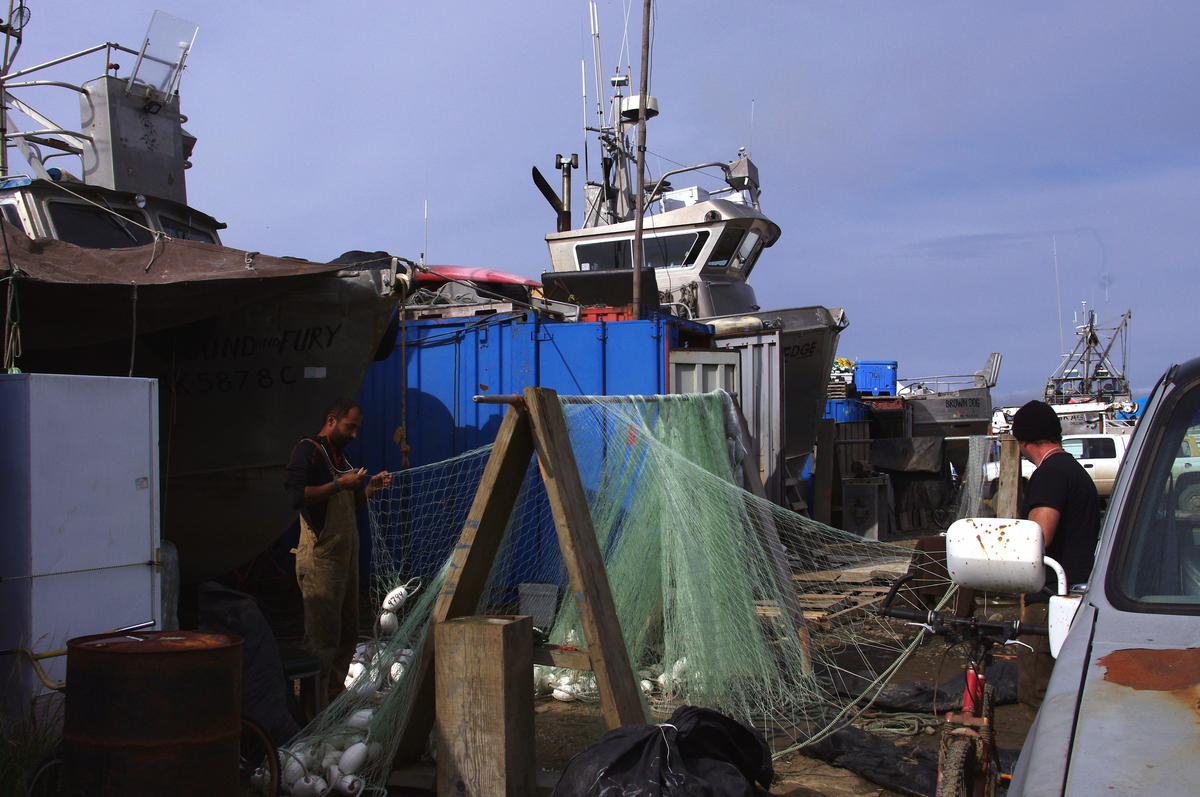 A group of researchers is trying to figure out what draws people to the Bristol Bay fishery and what new entrants need to get involved. For students in the region, they’re finding that it’s often all about family. Coleman has also been interviewing fishermen in those same communities, greenhorns and old hands alike, to find out why they put a net in the water – and what makes it possible for them to do so. Most of her work so far has focused on people who live in the region.
A group of researchers is trying to figure out what draws people to the Bristol Bay fishery and what new entrants need to get involved. For students in the region, they’re finding that it’s often all about family. Coleman has also been interviewing fishermen in those same communities, greenhorns and old hands alike, to find out why they put a net in the water – and what makes it possible for them to do so. Most of her work so far has focused on people who live in the region. 


























